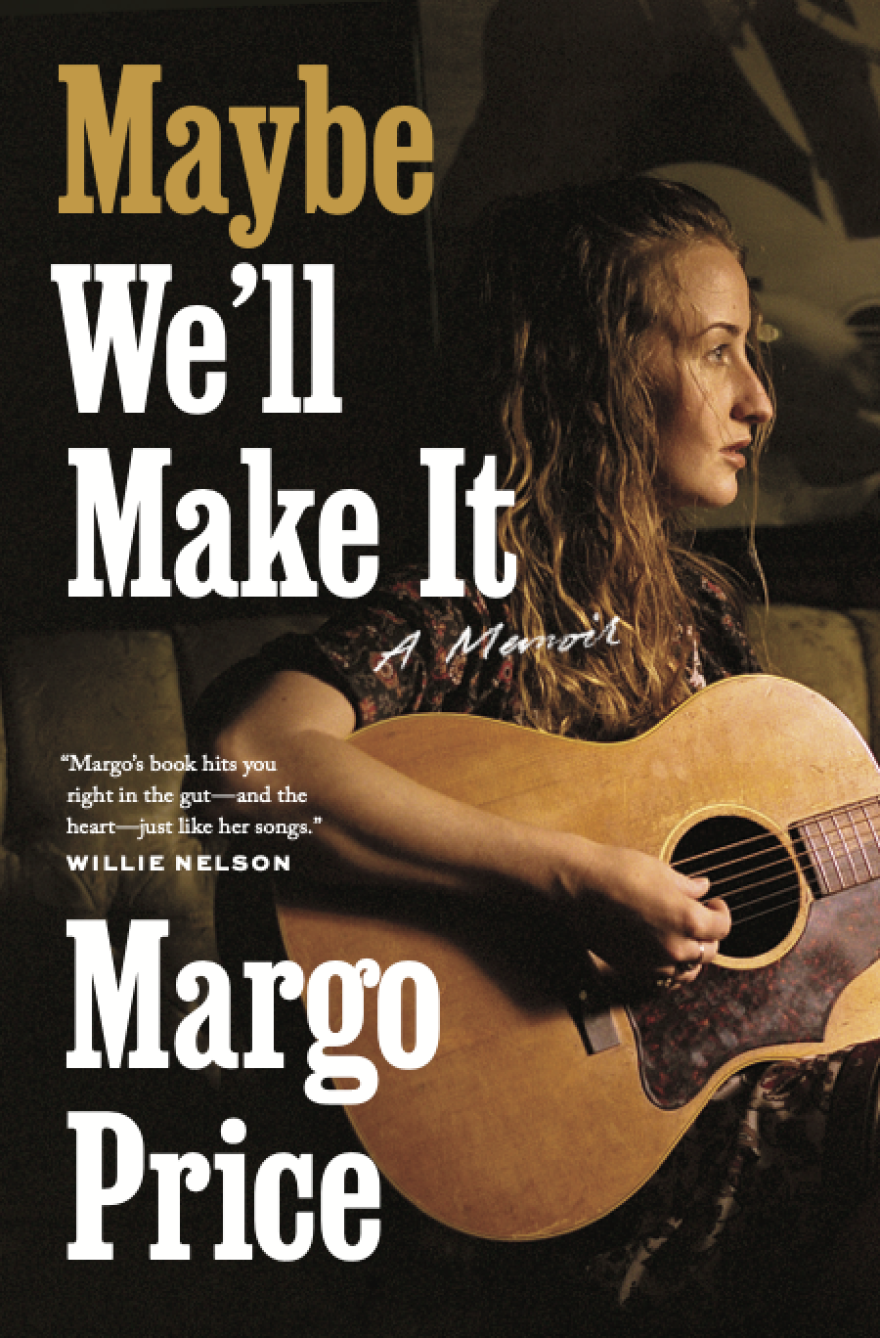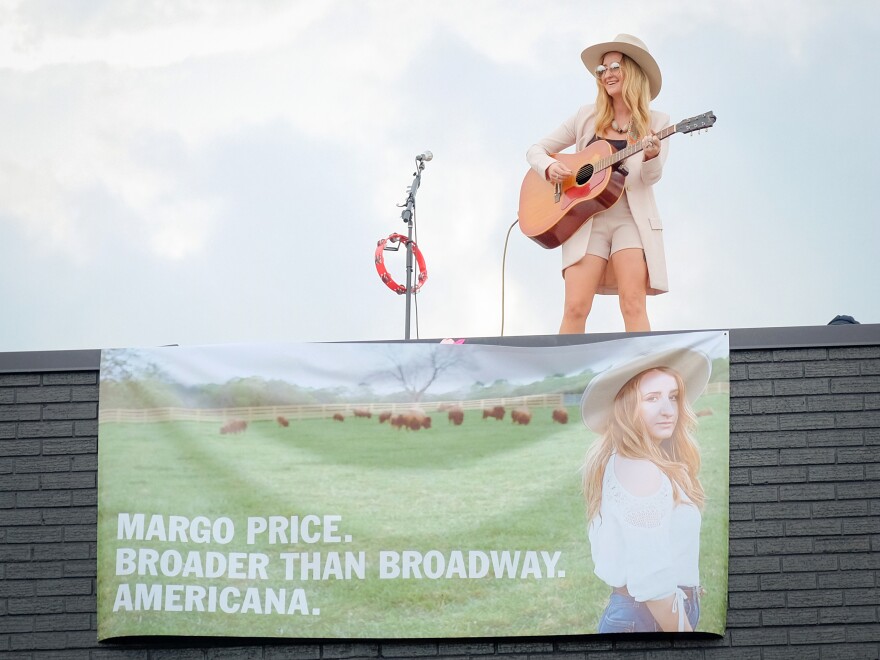Margo Price is a singer-songwriter based in Nashville. The below appears in the chapter "Uppers, Downers & Out-of-Towners" from Price's forthcoming book, Maybe We'll Make It: A Memoir, publishing Oct. 2022 from Texas University Press. In it, we join Price and her new family in 2012, as she and her partner, Jeremy Ivey, continue to build lives and careers around music.
Jeremy and I made a bad habit of staying out long past last call, trading off so that one of us could stay home to care for our young son while the other raged. It was no way for new parents to act and it was a complete miracle that we made it out of that era alive. We were high-functioning in those days. I grew increasingly skilled at managing and hiding my drinking from the world. I was also protected by many of those around me, because they were all high-functioning drinkers as well.
We sometimes partied with the bartenders until five or six in the morning. Being out constantly on opposing nights was hell on our marriage and our livers. Our bank statement was a sad sight. We were spending a small fortune on drinks we really couldn't afford. But we always found a way.
We plowed through our days with a vicious hangover like it was nothing. But we always made sure that Judah was looked after. We kept him well fed, clean, safe, and deeply loved, but we weren't taking good care of ourselves.
From 2010 to 2015, a constant stream of people crashed in the basement guest room at our house. We had a rotating door open to transients and train-hoppers, and our home on Fernwood was like a hostel for wandering musicians and vagabonds, with our spare bed and couches open to almost anyone in need of a place to stay. We believed in paying it forward and giving shelter to those with little money who came to the city to play a show or pursue a dream. It always came back to us when we found ourselves playing a gig in a strange new town, unable to afford a hotel.
Among the bands and solo artists that we hosted were Brittany Howard and Alabama Shakes, Clear Plastic Masks, Promised Land Sound, Benjamin Booker, Willy McGee, Sam Doores and the Tumbleweeds (later known as the Deslondes), and Hurray for the Riff Raff, who came with an entire entourage of bohemians, dropouts, train-hopping gutter punks, and stray dogs.
One hot summer night, there must have been 25 or more people staying at our house. The lot of us carried on until two or three, singing songs, smoking rollies, and taking turns pulling from a bottle of George Dickel. As the night wore on, people began searching for places to sleep all around the house. We eventually ran out of beds and couches, so we made pallets all over the floor as makeshift mattresses. When we ran out of space inside, the rest of the crew crashed outside in the tall grass of the backyard. I felt bad they had no beds, but it was summer and they seemed to enjoy it. There were random hippies and freeloaders passed out all over our property.
The next morning, Judah woke around seven. I picked him up from his crib and carried him into the kitchen. My mission was to put on the coffee, feed Jude some cereal, and clean up the vile mess of beer cans and wine bottles strewn about the kitchen and the back porch. While I was putting the water on to boil, Judah crawled into the living room, where Riley Downing, one of the Tumbleweeds, was sleeping on the couch. Jude took his toy train and began to run it along Riley's arm and head, waking him up with a "Choo choo." Even as a two-year-old, he was pretty used to there always being strangers around and was shy with almost no one. Riley opened his eyes and laughed at the sight.
"Judah, honey, let him sleep!" I said as I noticed the comedic interaction.
"Aw, that's all right!" Riley said with a laugh. "I love little kids." He sat up and grabbed a toy car on the floor next to him and began making an engine sound: "Vrooooooom, vroom!"
Judah toddled back over and started to play with him. He was so adorable at that age, with a cherub face; blond, curly hair; and long eye-lashes that framed his big blue eyes.
"I can play with him while you get a shower or do whatever you need to do," Riley offered.
"You are an angel," I said. "I'll just finish makin' some coffee. That's really all I need right now."
While Riley played with Judah, I made a strong brew in the percolator. Then I brought Judah some cereal and sat down on the floor beside them.
"You hungry?" Riley asked. "I can cook up some breakfast for everyone."
"Starving. There's a lot of people here though. I don't think I have enough eggs and bacon to feed everyone."
"I'll run up to the store. I know just what I can make that's cheap and tasty," he said with a grin.

Riley was quite the character; he hailed from Missouri by way of Louisiana and had a real down-home charm about him. He lived an untethered life and had hopped trains with Alynda Lee before joining up with the Tumbleweeds. He talked slow and low but had a great sense of humor, and both his wit and his songs were sharp as a knife.
Twenty minutes later, Riley returned from the Piggly Wiggly up the street.
"Gonna cook up some pork brains!" he announced, holding up several tin cans.
"Yum," I said, not knowing if he was serious or not — but he most certainly was. He cooked up eggs and pork brains that morning, and most everybody ate them, because they were hungry and it was free — and because they didn't know what it was.
That's how it was in those days: a communal effort to inspire each other and take care of each other. We were all loser poets struggling to keep our heads above the water and the booze. Looking back, there was a romanticism in knowing that we might be failures but that we were talented failures in a business that championed mediocrity. Even in the lonely shadows of the burning spotlight, beyond the endless roads to the sprawling cities and trash towns, between the empty gas tank and the underattended gigs, we were spreading the true gospel of meaningful music and the lost art of poetry and songs. We would not sell out.
Copyright 2022 NPR. To see more, visit https://www.npr.org.

